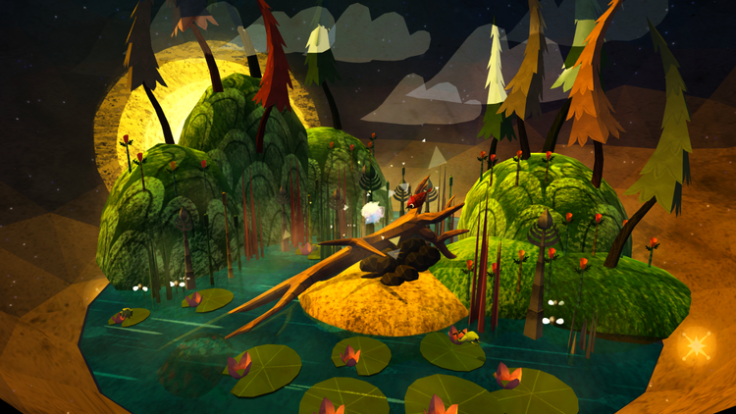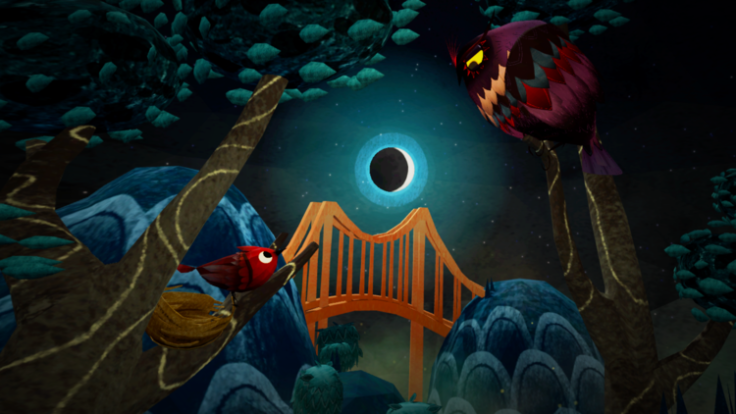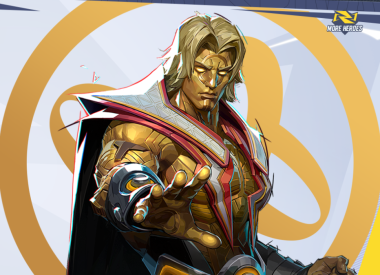Luna, the next release from Funomena, the pioneers behind 2013’s Journey, is shaping up to be one of the most ambitious VR projects on the horizon. It’s not aiming for technical triumphs as one might expect, at least not in the conventional sense. This won’t be a VR trip to the holodeck. Instead, Luna tells a highly-stylized storybook tale about a bird that eats the moon and needs to puzzle out its dreams in order to heal the world around it. Robin Hunicke, co-founder of Funomena, believes they’re on to something special. During a demo at a PAX convention Hunicke was moved to tears when she watched a child try to comfort one of the animals in need of the bird’s assistance.
“It actually made me cry a little bit, it was so great,” she told iDigitalTimes at the Tribeca Games Festival in New York City. “And this kid actually came twice. And he came one day then he came back the second. The first day that he came he was playing the game and there's a point where after you've built your terrarium you go down inside your terrarium and you see this little turtle come out of the water. And as soon as the turtle came out he dropped both controllers and was just hugging it.”

There’s no prompt in the world that can compel a person to do that in a game. And it speaks volumes of the potential a game like Luna offers for VR, where so often the expectation is on photorealistic worlds instead of imaginative spaces. Hunicke saw in that moment confirmation that Funomena’s work was headed in the right direction.
“He was immediately drawn to it and could tell the turtle was sick and not well and that he wanted to fix it,” she said. That he was so compelled to just actually be empathizing with the character was really a goal of ours with the production. So it made us all just gasp and go 'it's really possible!'”
This isn’t the first time Hunicke witnessed one of her games inspiring people to make connections. In 2013, Journey rocked the gaming landscape by introducing co-op without communication. Players could share an adventure together but would never speak or know each other. The emotional impact of the game was so intense that Hunicke later learned a missed connections-style website went up where players could try to find each other.
“And I had really hoped there would be some kind of a player movement towards that kind of connection, and when it really happened it was the same as seeing that kid reach out and grab the turtle,” she said. “We can do more with games. We can create connections. It's just so powerful.”
Hunicke approaches games with a deep sense of empathy and responsibility. She doesn’t talk about playtime or DLC or mechanics. Instead, she talks about what a game should mean to people and holds herself to a high standard. These concerns are especially relevant to VR, where the conduit between game creator and game player is more direct than anything the industry has seen so far.
“As we start to build experiences for VR and AR and eventually for merged or mixed reality, it's a lot of responsibility. We really need to start thinking about what we're doing, what we want to build, what behaviors do we want to encourage, how do we want kids to experience this stuff, how do we want them to engage,” she said. “What do we want people to say after they've played them? What are the conversations that we want to have happen around the experiences?”
No official platform info or release window has been set for Luna , but current demos have been performed with Oculus Touch. For more info visit the official site or follow Funomena on Twitter.


















